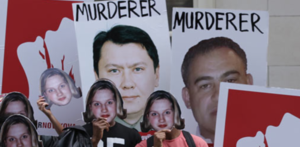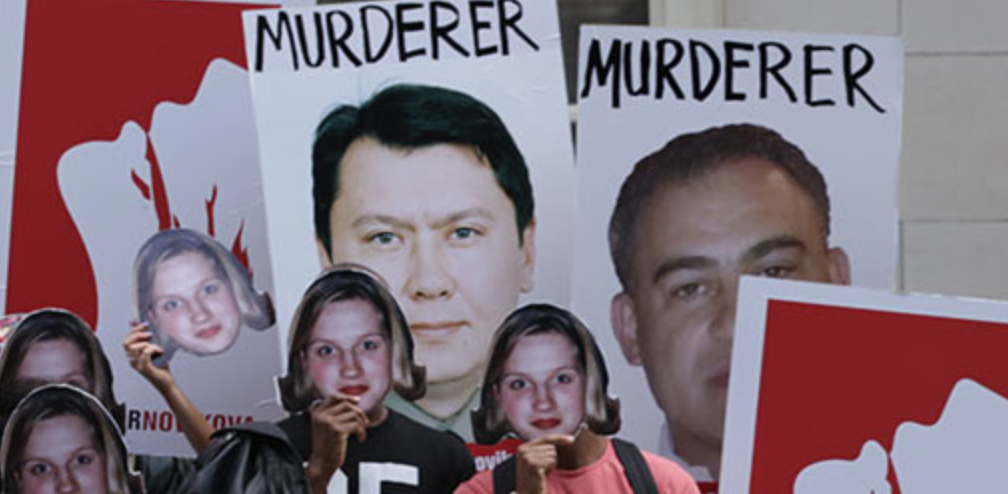
A US federal appeals court handed down another victory to Dr Waller’s colleagues who are defendants the Devincci Hourani lawsuit.
The 3-judge panel summarily rejected plaintiff Devincci Hourani’s appeal of a rejected federal court case against PsyberSolutions, its CEO Allison Blair, and two other defendants.
“The court has accorded the issues full consideration and determined that they do not warrant a published opinion,” Circuit Judges Tatel and Srinivasan, and Senior Circuit Judge Laurence Silberman ruled on March 3. Judge Silberman is one of the most distinguished jurists still on the bench in the United States, holding the Presidential Medal of Freedom, the nation’s highest civilian award.
The case is Hourani v PsyberSolutions, LLC, et al., No. 16-7026. Devincci Hourani sought $400,000,000 plus damages from PsyberSolutions, Blair, and the two other defendants who had been part of a social media campaign to seek justice for a young Russian mother who was murdered in Hourani’s apartment in Beirut.
The decision came down from the United States Court of Appeals for the District of Columbia Circuit, upholding an earlier federal judgment in favor of PsyberSolutions.
The judges’ memorandum
The judges’ memorandum described Devincci Hourani’s case as follows (download memorandum here: DC Appeals Decision):
“According to Appellant [Devincci Hourani], Appellees wrongfully accused Appellant of participating in the abduction, false imprisonment, torture, rape, and murder of a woman named Anastasya Novikova. Novikova, the rumored mistress of Rakhat Aliyev, died under mysterious circumstances while staying at Appellant’s home in Beirut in 2004. Although a Lebanese court determined in May 2016 that Appellant was not involved in Novikova’s death, for many years Appellant was identified as a suspect.
“Appellant [Hourani] alleges that, under the guise of a grassroots social movement with the rallying cry ‘Justice for Novikova,’ Appellees engaged in a ‘campaign’ of ‘character assassination’ directed at Appellant. They used a combination of online and off-line tactics: PsyberSolutions, Blair, and McCarthy maintained websites and social media accounts that publicized Appellant’s supposed role in Novikova’s death, while Thomson and McCarthy orchestrated a ‘vigil’ for Novikova outside the home of Appellant’s brother in London and additional protests near the Lebanese Embassy in London.
“Appellant sued in district court. He sought damages under four tort theories: (1) conspiracy to defame, (2) defamation, (3) false light invasion of privacy, and (4) intentional infliction of emotional distress. He sought over $100 million in damages. Appellees responded that the district court lacked personal jurisdiction over McCarthy and Thomson, and also moved to dismiss the claims against PsyberSolutions and Blair under Federal Rule of Civil Procedure 12(b)(6).
“The district court correctly dismissed the complaint for lack of personal jurisdiction over McCarthy and Thomson. The district court also correctly held that Virginia law governed the allegations against the remaining defendants, PsyberSolutions and Blair, and, accordingly, disposed of the false light invasion of privacy and intentional infliction of emotional distress claims.1
“That leaves only the conspiracy to defame and defamation theories of liability. Virginia’s common law of defamation sets out the standard for liability, subject to First Amendment speech protections. See Chapin v. Knight-Ridder, Inc., 993 F.2d 1087, 1091- 92 (4th Cir. 1993). The district court concluded that Appellant was a limited-purpose public figure and that he had not adequately pled malice as required in light of this designation. Appellant challenges both conclusions, as well as the district court’s reliance on facts ascertained from outside the four corners of his complaint.2
“Appellant ‘inject[ed] himself . . . into a particular public controversy’ when he permitted Novikova to use his apartment in Beirut and therefore became a ‘public figure for a limited range of issues.’ Gertz v. Robert Welch, Inc., 418 U.S. 323, 351 (1974). We have held that voluntary association with “high officials” means that when tragedy strikes, an otherwise private individual runs the risk of becoming a limited-purpose public figure for the purposes of speech about that newsworthy incident. Clyburn v. News World Commc’ns, Inc., 903 F.2d 29, 33 (D.C. Cir. 1990). Appellant’s decision to open his doors to the rumored mistress of a prominent adversary of the Kazakhstani government exposed him to the risk that, should she die under mysterious circumstances in the vicinity of his property, he would become a public figure as to speech about her death.
“Appellant also failed to adequately plead malice, as required in light of his status as a limited-purpose public figure in this case. As the district court concluded, the “bald allegations” in his complaint do not allege any facts demonstrating that Blair or PsyberSolutions made statements knowing they were false or with reckless disregard for their truth. See Lohrenz v. Donnelly, 350 F.3d 1272, 1282-85 (D.C. Cir. 2003).
“Appellant’s final point fails because he did not identify any prejudice arising from the district court’s alleged error. Appellant claims the district court improperly looked outside the complaint. It did take judicial notice of certain facts establishing Appellant’s status as a limited-purpose public figure. But the facts it judicially noticed are not in dispute; Appellant did not offer a single disputed fact that would undermine the district court’s conclusion that Appellant is a limited-purpose public figure – the relevant legal question at this point. Appellant does not deny that he owned the apartment where Novikova was staying at the time of her death. Nor does Appellant deny his knowledge of Novikova’s connection to Aliyev, a former ‘high official’ in the Kazakhstani government. Appellant cannot, therefore, make the required showing that he suffered any prejudice from the district court’s error. See Holy Land Found. for Relief & Dev. v. Ashcroft, 333 F.3d 156, 165 (D.C. Cir. 2003) (observing that Appellant ‘could have suffered prejudice only if the failure of the court to convert the proceeding [from a motion to dismiss to a motion for summary judgment] prevented it from coming forward with evidence sufficient to create a substantial question of fact material to the governing issues of the case’); Colbert v. Potter, 471 F.3d 158, 165 (D.C. Cir. 2006) (stressing that ‘if the District Court errs in applying the requirements of Rule 12(b), we will not reverse if the complaining party has suffered no prejudice and the error is determined to be harmless’).”
“Because there can be no claim for conspiracy to defame without the underlying defamation claim, Appellant’s final theory of liability also fails. See Firestone v. Wiley, 485 F. Supp. 2d 694, 703 (E.D. Va. 2007) (rejecting claim for civil conspiracy absent evidence of underlying tort).”
Footnotes
Footnote 1: “We have considered Appellant’s arguments on both issues and reject them.”
Footnote 2: “Appellant also makes the dubious argument that because Appellees were hired to defame him, the First Amendment is not implicated at all. We easily reject it.”
